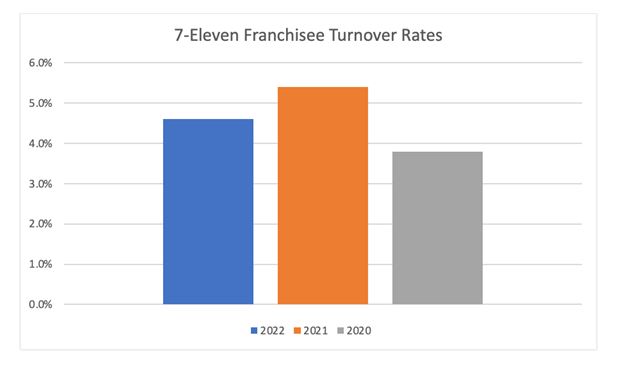

Franchisee turnover is a common issue that significantly impacts the success of any franchising system. A high turnover rate can negatively affect profitability, brand reputation, and the overall operational efficiency of the entire network. This article explores why franchisee turnover is so common, and more importantly, how to effectively improve franchisee retention, building a sustainable and thriving franchise system. This comprehensive guide will delve into the key reasons behind this phenomenon and provide actionable solutions. We’ll look at various aspects, including challenges within the franchisor-franchisee relationship, inadequate support systems, and the role of training and development. The structure will cover the key issues, analyze common causes, and offer specific, proven strategies for boosting franchisee retention.
Understanding the Root Causes of High Turnover
High franchisee turnover is a critical issue that can significantly impact a franchisor’s bottom line. While a certain amount of turnover is natural in any business, consistently high rates can indicate underlying problems within the franchise system. The root causes of franchisee turnover can be complex and multifaceted, often stemming from several interconnected factors.
Inadequate Support Systems
A lack of sufficient support from the franchisor can be a significant driver of turnover. Franchisees need guidance and resources to succeed, including training, marketing assistance, and access to established industry best practices. Without adequate support, franchisees may struggle to achieve profitability, leading to frustration and ultimately, deciding to leave the franchise system.
Unclear or Unrealistic Expectations
Sometimes, the expectations set by the franchisor are unrealistic or unclear. This can lead to frustration and disillusionment amongst franchisees. When the franchisor does not clearly define the responsibilities, required procedures, or projected outcomes, this can lead to feelings of inadequacy. Consequently, franchisees may seek opportunities with a more well-defined and supportive business model.
The Critical Role of Franchisor-Franchisee Relationship
The relationship between the franchisor and the franchisee is fundamental to long-term success. A strong relationship fosters trust, open communication, and a sense of partnership. A positive relationship creates a supportive ecosystem where franchisees feel valued and empowered to succeed.
Transparent Communication and Feedback
Open communication and feedback are essential components of a healthy franchisor-franchisee relationship. Franchisors should proactively communicate important updates, address concerns promptly, and solicit feedback from their franchisees to ensure they understand the expectations and are satisfied with the support structure. Feedback should be proactively sought, analyzed, and applied to improve the overall franchise model.
Fair Compensation and Profit Sharing Structures
Franchisees deserve a compensation structure that aligns with their efforts and contributions. Establishing fair and transparent profit-sharing structures, which recognize both franchisor and franchisee contributions to the success of the model, is critical to foster an environment of fairness and equity. Such a structure encourages commitment from both sides.
Addressing Training and Development Needs
Comprehensive training and development programs are crucial for franchisee success. Effective training should cover everything from operational procedures to marketing strategies and customer service techniques.
Ongoing Training and Mentorship
A strong franchise model includes ongoing training and development to help franchisees adapt to evolving industry trends and challenges. Regular workshops, seminars, and online resources can ensure franchisees have the tools they need to succeed. Mentorship programs, connecting experienced franchisees with new ones, can also prove beneficial.
Continuous Learning and Skill Enhancement
Franchisees need access to ongoing learning resources that keep them updated with current industry best practices and evolving consumer trends. By prioritizing continuous learning, franchisors demonstrate their commitment to their franchisees’ long-term success within the franchise system.
Creating a Positive Franchisee Experience
Focusing on the franchisee experience and fostering a supportive community is crucial for retention. Positive experiences foster a sense of belonging and camaraderie.
Franchisee Forums and Networking Opportunities
Creating platforms for franchisees to connect, share experiences, and learn from each other can foster a sense of community and support. Online forums, regional meetings, and collaborative platforms can be established to promote this engagement.
Recognizing and Rewarding Success
Recognizing and rewarding franchisees who consistently demonstrate high performance, innovation, or exemplary service can motivate them to remain within the franchise system. Implementing a structured recognition program can create additional incentive and engagement opportunities.
Analyzing Data and Metrics
Understanding franchisee turnover trends through data analysis is essential for identifying problem areas and implementing effective solutions. A data-driven approach enables you to pinpoint specific issues. Analyzing performance data can reveal patterns and trends in franchisee experience and identify areas for improvement.
Tracking Turnover Rates
Regularly tracking franchisee turnover rates allows for quick identification of problem areas within the franchise model. If turnover rates are disproportionately high in specific geographic areas, franchise models, or franchisee demographics, these areas should be analyzed in detail. Regular analysis will prevent these issues from escalating or becoming more widespread within the franchise network.
Understanding the Root Cause of Turnover
By conducting franchisee surveys and focus groups, franchisors can gather valuable insights into the reasons behind high turnover. These qualitative data will highlight the concerns and frustrations specific to individual franchisees and areas. These surveys and insights will provide critical feedback to establish the basis for improvement in areas for both franchisor and franchisee satisfaction.
In conclusion, franchisee turnover is a significant concern for franchisors, impacting profitability and brand reputation. Addressing the root causes, implementing proactive retention strategies, and fostering a positive franchisee experience are crucial for success. By cultivating a supportive environment, offering ongoing training and development opportunities, and providing transparent communication, franchisors can significantly improve franchisee retention rates. This article has provided actionable insights and strategies to help you tackle this challenge. Ready to improve your franchisee retention? Contact us today for a consultation.